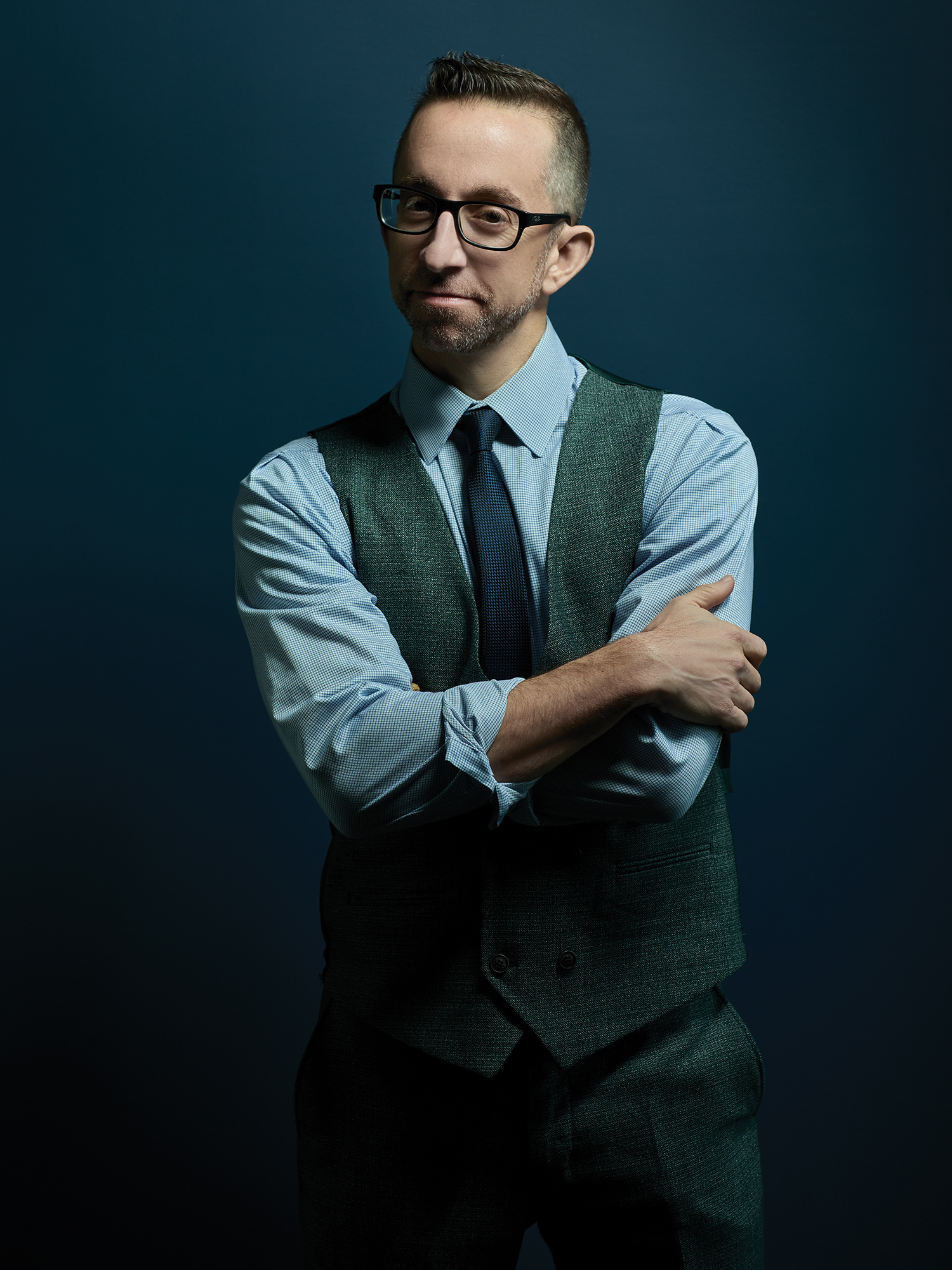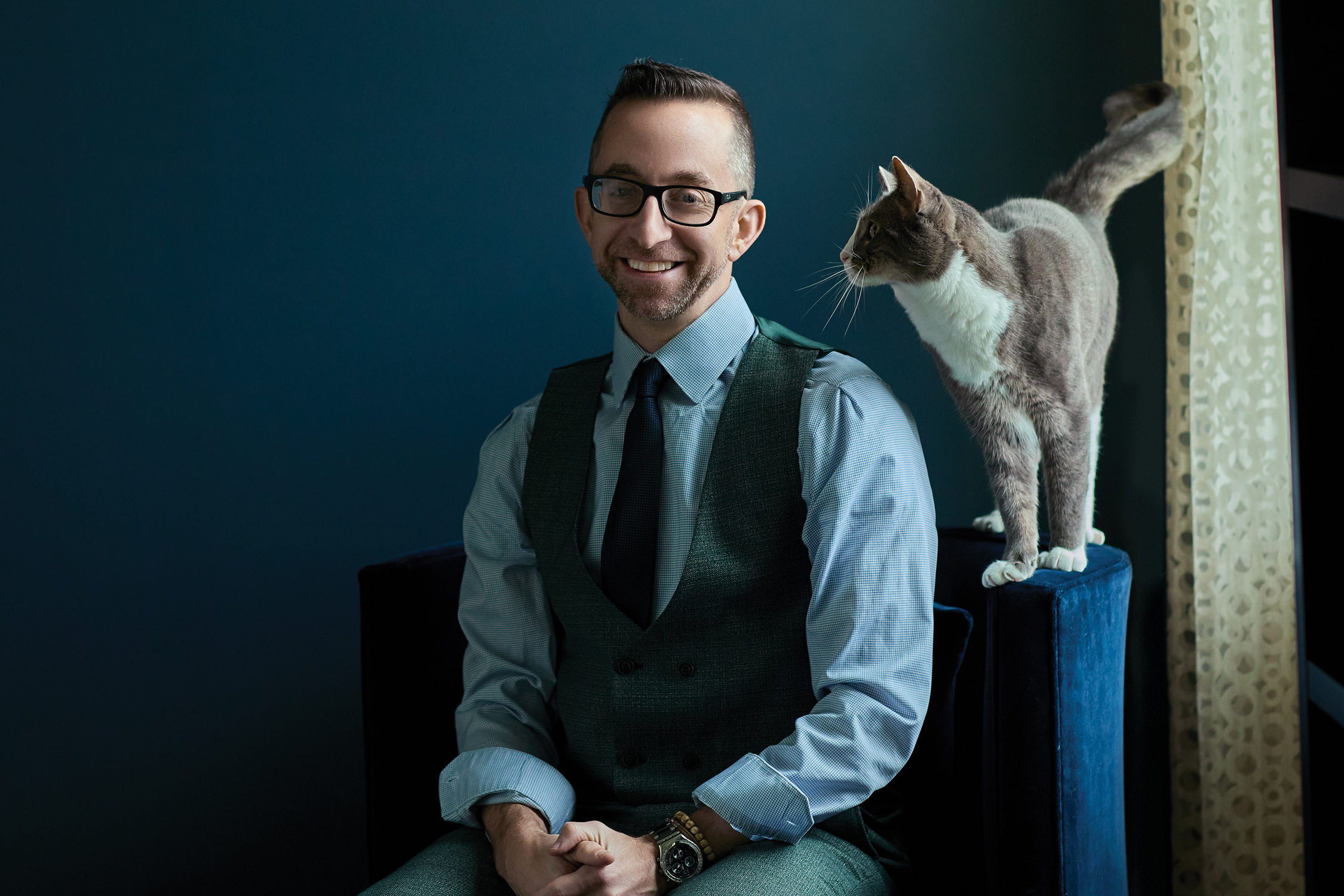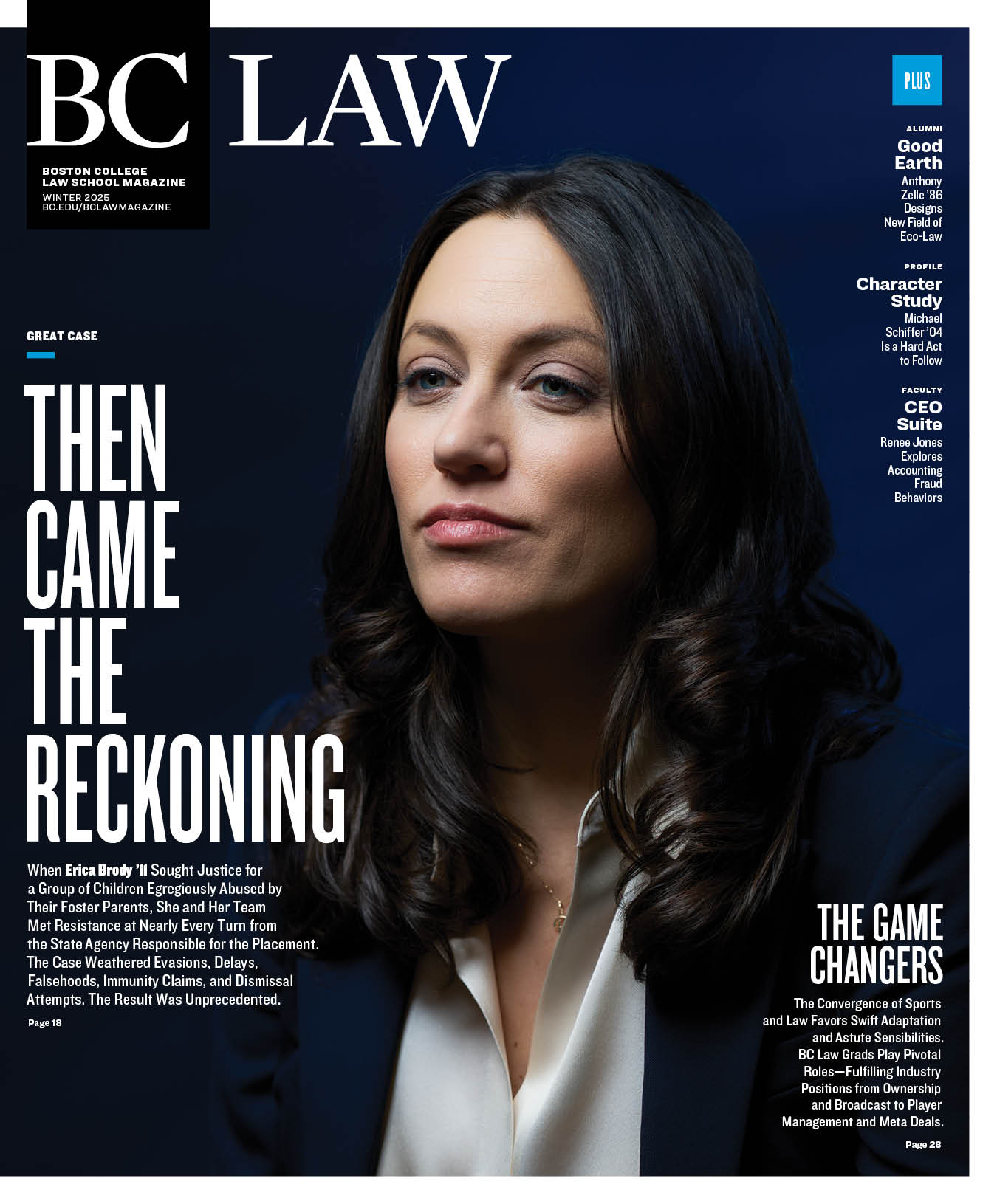Before Michael Schiffer ’04 decided to go to law school, he flirted with another career. Acting. “I was a couple credits shy of a minor in theater at Cornell,” he says of his undergrad years, “and I had an agent in New York who sent me out on auditions. I liked it but I think the people who succeed as actors are the ones who feel a need to act, and I didn’t have that.”
In one TV commercial he did for Office Depot, he’s dressed as a basketball player dribbling away from the basket toward a line of his teammates. As they approach, he turns to face the camera, revealing himself to be a good foot or two shorter than everyone else. “Just in case that basketball scholarship doesn’t work out,” the voiceover intones drolly, “you’ll need something to fall back on.”
Schiffer didn’t know it at the time, of course, but the ad encapsulates several of the qualities that have helped him rise from his post-BC Law job doing litigation at Goodwin Procter through more than a decade at the boutique media firm now known as Frankfurt Kurnit, to six years climbing the legal ladder at Twitter before finally landing at his current venture, as a founding owner of S2 Advertising Law in Long Island. It shows a man with the chutzpah to go for his dreams despite the challenges, a man who’s not worried about impressing others, and, perhaps most plainly, a man with a sense of humor—all attributes Schiffer’s friends and colleagues say he has in spades.
“When Schiffer arrived at [Twitter], as senior marketing counsel, in 2019, he was the only legal marketing counsel, so his job on this super fast-growing, fast-moving team was to institute processes and teach the marketers how to not get in trouble with the law.” ”
Jeffrey Greenbaum, legal colleague
“Michael is a really funny guy,” says Allie McDonald, who worked with Schiffer at Twitter and is now senior legal counsel at Instacart. “He’s witty, creative, fun, and kind of artsy. He communicated with the young folks at Twitter in ways that they understood and that never felt forced. It made him very effective at what he did. He was a breath of fresh air.”
That kind of light approach also helped Schiffer bond with the clients in his civil litigation clinic at BC Law, says Alan Minuskin, the associate clinical professor who supervised his work. “He would take assignments very seriously and reach a level of depth that was beyond what most students would do,” Minuskin says. “But he never took himself too seriously, and I think it helped give him empathy for the people he worked with. He had the intellectual capacity to see the facts of a case but also the heart to understand his clients and make them feel heard.”
Those traits have served Schiffer well in all of his various incarnations, as litigator, in-house and external counsel, and founding partner—left turns in his career that were inspired largely by his father, a nephrologist and talented pianist who stopped practicing medicine after twenty years to become a financial consultant and later returned to the field as a hospitalist. “The thing Dad said all his life is, don’t just work to work—do the things you want to do,” Schiffer says. “It’s never over, no matter how old you are, and he led by example on that. It was very influential.”
That message was reinforced in the worst way possible when Schiffer lost his father in 2013 just two months after Schiffer lost his first wife, Lori, a Harvard Law graduate who worked at Weil Gotshal and died of breast cancer at age thirty-five. “Dad was always looking forward to retiring, and never quite got there,” Schiffer says. “And Lori’s death—” he trails off.
“He communicated with the young folks at Twitter in ways that they understood and that never felt forced. It made him very effective at what he did. He was a breath of fresh air.”
Allie McDonald, Twitter co-worker
Schiffer later met the former Jen Fink, director at the Community Synagogue Early Childhood Center in Port Washington, on JDate. Shortly after their 2015 wedding, she adopted his children, Jonah, now sixteen, and Nathan, fourteen. “Jen is now my inspiration for finding ways to make family a priority,” he says. “It all goes into needing to do what makes you happy. Money’s not the most important thing; time with family is. And there’s still a part of me that wants to make Lori proud.”
There’s no doubt he is doing that, according to Jeffrey Greenbaum, a managing partner at Frankfurt who was on the hiring committee that recruited Schiffer. “Michael went through things that no one should have to go through, at any stage in life, but certainly not as young as he was,” Greenbaum says. “We were all extraordinarily impressed by his professionalism and resilience during that time. Most people wouldn’t have been able to do it all in the way he has.”
How Schiffer arrived at a place that makes him happy is a circuitous tale.
After realizing acting wasn’t for him, he started considering careers where he could “still be among creatives.” Journalism, with which he’d dabbled in college, was a frontrunner, but after experiencing the highs and lows of acting, he wanted something more stable. He got a job as a paralegal at Fross Zelnick, which specializes in trademark and design cases, as “a test run for going into law,” he says.
“After a few months I could see, yeah, I want to do this,” he continues, “but I want to be in charge rather than taking direction as a paralegal.” He was ready for a change of scenery and left New York State, where he’d also grown up—in Albany—for Boston, where his sister was attending BU Law. “I looked at BU and BC,” he says, “but I liked that BC Law was separate from Boston and even from the rest of BC, so it becomes your family while you’re there. And it’s really good at injecting that element of humanity into everything we do.”
After graduation he started at Goodwin Procter, attaching himself to whatever IP and trademark litigation cases he could. “But the goal at a big firm is to make partner,” he says, “and I wanted to get out of the rat race.” When he was recruited by Frankfurt’s advertising group, he says, “I’m like, wow, there’s a firm that has a whole practice devoted to advertising? There weren’t very many that did, and it was not only in my area of interest, but it shifted me away from litigation and into counseling.”

“Unlike litigators,” says Greenbaum, “the advertising-lawyer bar is a really small group. They’re people who sought out this field, and especially back then it was a small community where everyone knew one another. Michael is not only a part of that community, but he’s thought of as one of the leaders in the field. He had a genuine passion for the subject area. That’s why Twitter pursued him when they did.”
At the time, Schiffer says, “the name Twitter was in the public vernacular but they hadn’t quite figured out how to monetize the platform.”
His move coincided with “an explosion in the number of TV channels available and all of the commercial opportunities that provides,” Greenbaum notes. “There’s a lot more advertising being created now and a lot more different types, so the rules are changing all the time and there’s a high demand for lawyers who can understand that and keep up.”
When Schiffer arrived at the company, as senior marketing counsel, in 2019, of the almost 5,000 employees, “probably at least 300 were marketing people,” says McDonald. “He was the primary legal marketing counsel, so his job on this super fast-growing, fast-moving team was to institute processes and teach the marketers how to not get in trouble with the law.”
“He had the intellectual capacity to see the facts of a case but also the heart to understand his clients and make them feel heard.”
Professor Alan Minuskin on Schiffer’s aptitude as a student
Schiffer worked with his in-house clients on collaborations with Broadway musicals, Disney, and HBO, to name a few, and says he found it “great to be part of an exciting environment with so many smart, enthusiastic colleagues who really wanted to see the company succeed.” He rose through the ranks to associate legal director, then legal director, when the ax came down.
“Elon made the bid to purchase the company in 2022,” he says, “and we all saw the writing on the wall. For the first two weeks no one heard from him, and then our first communication was either you got an email to your personal account saying you were being let go and didn’t have access to your work computer anymore, or you got an email to your work address saying hey, you’re still here.” Within a couple months Musk had fired almost the entire marketing team. “Before I got my email, I was thinking which version would make me happier,” says Schiffer, “and I realized I would be happier to be let go.”
His partner at S2, Wendy Schechter, had been a colleague at Frankfurt and was also contemplating “starting her own thing,” so Schiffer’s layoff provided the perfect opportunity for the pair to get serious about drawing up a business plan. “Twitter was creative but also technical,” Schiffer says, “so I guess now that’s a niche of mine to be able to do that sort of work.”
“Michael is always interested in pushing himself to do new and challenging things,” says Greenbaum. “We were sorry when he left for Twitter and would have welcomed him back after his layoff. He’s one of those lawyers whose absence from the firm is still felt all these years later. But there’s a lot of interesting things to do out there.”
Matthew Merritt, a former BC classmate of Schiffer’s who met him on the first day of law school and says he thought, “This is a guy I want to be friends with,” isn’t surprised that Schiffer ended up “taking the leap to build his own thing.” Merritt, now general counsel for Oatly, the dairy-alternatives company, says he has enjoyed watching his friend’s evolution.
“No offense to Goodwin or Twitter,” Merritt says, “but I’m glad he’s not laboring deep within the salt mines of some big firm. He’s an incredibly sweet, thoughtful, caring guy who also happens to be a careful and insightful lawyer who isn’t just going through the motions, and S2 being his own deal enables his warmth and wittiness and personality to come through. That’s a cool thing for him.”



